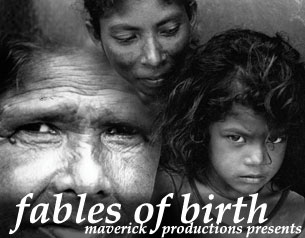In the remote and forgotten villages of Eastern India, separated from civilization by a vast roadless plain, Dai is delivering a baby exactly as her ancestors would hundreds of years ago. She is a midwife and in this region that is to be a representative of an ancient and mysterious art, often employing methods unthinkable to us in the West. Our heroines, two ancient and delightful midwives, are never short of a saucy joke - or a wise word. Humorous and uplifting, beautifully shot and poignant, an intimate glimpse into a disappearing world.
"All that's needed is Manjura, some twine, a coin and a blade", Manjura says as she firmly but delicately winds the twine around the baby's umbilical cord. The feisty 62 year-old Manjura is a torchbearer of the midwifery tradition in this region. She lays the child on her knees and rubs the screaming infant with mustard oil, believed to cleanse the baby of the impurities associated with childbirth. To break the tension Manjura cracks a joke to the watching children. However she doesn't have the same patience with the cameraman;
"even our chatting is being captured by you. What a smart ass you are!"
While Western knowledge and hospitals remain a distant dream to the people of this area, the experience and knowledge of childbirth held by Manjura and the other travelling midwives, is gold dust to expectant mothers here. The women travel daily by foot, providing assistance and reassurance. The combination of fierce pride and confidence, and their humorous and jovial nature, make them an invaluable to the nervous mothers to be.
"Once you get married you'll realise the fun of it all", Kalindi suggestively tells us with a cheeky grin on her face.
In this world, a far cry from civilisation, most of the practices of the midwives remain shrouded in mystery and superstition. But in this heart warming documentary we are given an insight into practices far outside the remit of Western medicine. As she leans over the baby, Manjura administers the slicing act, piercing the baby's skin at certain points with a scythe. Upon being questioned about it Manjura flies into a rage,
"it's to prevent enlargement of the spleen", she says, fiercely defending the rite. Doctors frown on it but the traditional midwives insist it combats the problems they face from a poor diet. It is not only with babies that they have unique practices, which have evolved through the generations.
"We know special roots and weeds which prevent conception", say the old ladies laughing at our ignorance. Yet they refuse to say more and do not totally give away their secrets.
The midwives, through their mix of pragmatism and spiritualism, control the realm of childbirth in this remote corner. They are not only midwives but also conjurers of potions, holders of secret knowledge and confidents for frightened mothers. A breathtaking vision of a society on the fringes of civilisation, still reliant on a cultural and traditional memory, to guide them through life's most important rites of passage.
Directed By Sahana Bhattacharya
LEARN MORE.
WATCH MORE.
JOIN THE DISCUSSION.
MIDWIFERY.
 In the remote and forgotten villages of Eastern India, separated from civilization by a vast roadless plain, Dai is delivering a baby exactly as her ancestors would hundreds of years ago. She is a midwife and in this region that is to be a representative of an ancient and mysterious art, often employing methods unthinkable to us in the West. Our heroines, two ancient and delightful midwives, are never short of a saucy joke - or a wise word. Humorous and uplifting, beautifully shot and poignant, an intimate glimpse into a disappearing world.
In the remote and forgotten villages of Eastern India, separated from civilization by a vast roadless plain, Dai is delivering a baby exactly as her ancestors would hundreds of years ago. She is a midwife and in this region that is to be a representative of an ancient and mysterious art, often employing methods unthinkable to us in the West. Our heroines, two ancient and delightful midwives, are never short of a saucy joke - or a wise word. Humorous and uplifting, beautifully shot and poignant, an intimate glimpse into a disappearing world.


